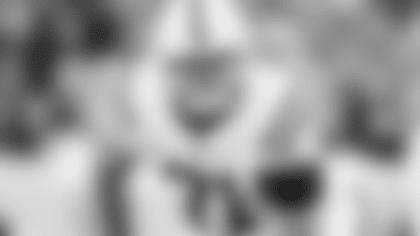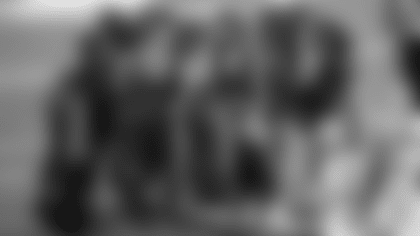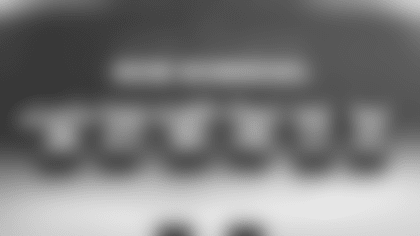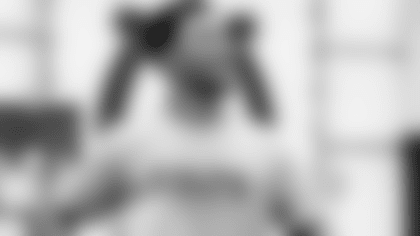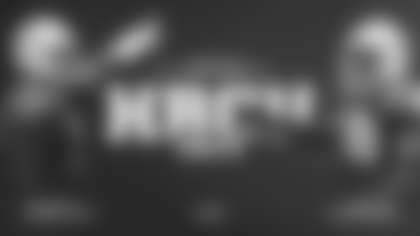Bill Polian is in his first season as Colts vice chairman after spending the previous 13 seasons as Colts president. Polian has a resume unique in the NFL. The only man to win NFL Executive of the Year six times, Polian in the 1980s built the Buffalo Bills into a four-time Super Bowl participant. In the mid-1990s, he built the expansion Carolina Panthers into a team that made the NFC Championship game in its second season, 1996. Since joining Indianapolis in 1998, he built the Colts from a 3-13 team in 1997 and 1998 into one that has made the playoffs 11 of the last 12 seasons, including AFC Championship game appearances after the 2003, 2006 and 2009 seasons, an AFC East title in 1999, AFC South titles in 2003, 2004, 2005, 2006, 2007, 2009 and 2010, Super Bowl appearances following the 2006 and 2009 seasons and a Super Bowl championship following the 2006 season. Each week during the season, in The Polian Corner, Polian and Colts.com will discuss issues pertinent to the Colts and the rest of the NFL.
The Polian Corner will run in two installments each week. Below is this week's first installment:
Q: You looked at yesterday's tape. People were frustrated by the loss. Were you less frustrated after you watched the tape?
A: Yes, but less so. Watching the tape today was a good example of a Jim Caldwell axiom from Joe Paterno that 'you never are as good as you look when you win and never as bad as you look when you lose.' First of all, I would really like to thank the fans. They were tremendous. They did their job. We didn't give them a lot to cheer about, and they were terrific. Hat's off to them. They did a phenomenal job. It bears repeating that they're so loyal and they stay with us so generously through thick and thin, and there's been a lot of thin this year. We have great fans, and I can't thank them enough. The way the ballgame broke out yesterday, the positives were that, by and large except for some technique mistakes which we can clean up and will clean up, we played pretty darned good defense. They came after us with a well conceived attack. We did a good job with the running game, by and large. We gave up some big plays, but those, as I say, were technique issues which can be cleaned up. One was a bad break. The long pass was a very bad break. We had three guys on the ball and we didn't get it. When that happens the other team is good, and they're very good. The downside of that is they've (the defense) been on the field far too often, far too often – more than 100 plays or close to 100 more plays than the offense. We have to do a much better job of controlling the football, otherwise we'll get our defensive guys punched out as hard as they play. They did play awfully hard yesterday, and they have every week. Offensively, we had a very bad day. When your quarterback isn't on, and Curtis (Painter) wasn't yesterday, you're not going to play particularly well. We ran the ball okay, but we couldn't convert third downs. Our timing was off. We didn't do a stellar job of blocking in certain situations in the passing game, and we need to clean that up. The kicking game was a positive. We covered well. Pat kicked very well. That part of it was good, but offensively we took a step back. We have to figure out a way to make sure that we take a step forward. I thought yesterday, ironically enough, we had a good plan. It was a Curtis plan, a plan that Curtis could execute. The injuries to the tight ends took us out of that. Then, we got a little helter skelter and it all went downhill from there. That's going to happen to you when you're playing a good team. (It was) nowhere near as bad as perhaps as you might feel after the ballgame when you looked at the tape. There's plenty to build on. There's plenty of things to work on. Nobody's dobber is down. Nobody's quitting, nobody's hanging it up. We're going to keep punching, and I think we'll get it squared away.
Q: What is your opinion on fans who have Andrew Luck shirts made up and wearing them to games?
A: I can't give you an answer except to say that all the people who were there yesterday were really terrific. I said that at the outset of the show, and we didn't give them much to cheer about as the afternoon went on. I thought they were charitable at the end and certainly as supportive as they possibly could be all the way through until the fourth quarter when we got the bad break on the fumble call which would have made it a game at that point. All I know is we're extremely grateful to those people. To all the folks who write and call to our facility, and we get many calls and letters and cards during the week that are positive and supportive, those are the people who we thank and who we want to win for. As to the Stanford quarterback, let me make this point. It is a little-known and almost universally ignored rule but I'm not going to, Mr. (Andrew) Luck has another year of NCAA eligibility should he choose to use it. The rule in the NFL is that I, or any other club official, is not allowed to speak about any player who is an underclassman. Why is that rule on the books? It is our feeling, and the feeling of everyone in the NFL, that players ought to make the decision to come out of college based upon hard, professional judgment made by people like myself at the appropriate time. The NFL has a committee called the College Evaluation Committee, on which (Colts Director of Player Personnel) Tom Telesco serves and on which I serve. We evaluate players basically during the months of November and December, and we report back to their colleges as to where we feel a player may go in the upcoming draft. That's highly confidential information. It is shared only with the player, his parents and his college coach. Then we hope the player makes an informed decision. Many of us, Rich McKay, the president of the Atlanta Falcons, Thomas Dimitroff, their fine general manager, (Colts Vice President and General Manager) Chris (Polian), Tom Telesco and I for example speak with families of underclassmen at that time and give them our assessment and answer their questions relative to whether or not a (player) should or should not come out. That process is one that we feel very strongly about. It should be honored. I recognize there are those who pay no attention to it. I'm not going to get into it because I don't want to break the rule and I believe the rule is a good rule. If I'm asked, I'll give my opinion to the appropriate people at the appropriate time. Now, anybody can wear any kind of jersey that they want. That's fine. I don't have any problem with that. It's a free country. Relative to Andrew (Luck) or any other underclassman, it's not right for me to comment, nor will I.
Q: With Robert Mathis and Dwight Freeney getting older, how are you looking at those positions?
A: Let me give you the broader picture because it's a very good question, and it's asked in broad context. Both those fellows are closer to the end of their careers than the beginning. I hope they continue to play, and I hope they continue to play at a high level. Chris (Polian) particularly and myself less so in terms of terms of just writing down the priorities then doing the scouting, would be derelict in our duty if we didn't say, 'Hey, there comes a time when we need to start looking.' Just as we need to start looking for Peyton's (Manning) replacement. You can't deny the fact that Father Time sneaks up on everybody. The two guys at the microphone (Bill Polian and Colts broadcaster Bob Lamey) can attest to that. The bottom line is it's time to start looking. We're focused on that. It's an issue we'll deal with. That said, I will say that both of those guys continue to play at an exceedingly high level. They both give every effort that they can. They're both providing leadership and setting a tremendous example for our younger players. I couldn't be more proud of the effort that both guys have made.
Q: It seems like teams make halftime adjustments that we don't seem to make. I'm not trying to be negative about Coach Caldwell. Is that being looked at?
A: Without referring to specific games, I can't answer (with) specifics. It is a point of emphasis for us to make sure we do a good job particularly on the first drive of the second half on both sides of the ball, offense and defense. Coach Caldwell mentioned today that that has not been something that he's really satisfied with. We have to go and spend extra time and special emphasis on how we get ready to play the second half, particularly early in the half. Yesterday's game is a real good example of how the game is played in the NFL. They only really had two blitzes in their game plan defensively. One they used in the first half, the other they saved for the second half. (It was) great strategy, terrific coaching. We made a mistake early on the first one, picked up the second one, weren't quite prepared when they went to the alternate blitz which was six men (blitzing) rather than five. The nickel back was coming late, but one involved five men, the other (blitz involved) six. We made the adjustment on the sideline and it seemed to work out okay. A lot of that during the ballgame is ying-and-yang. You should be doing the same thing, saving something to use in the second half. That's easier said than done, particularly when you're as bereft of starting talent as we are. By my count, we have 11 starters who out with injuries, if you count (tight end) Brody Eldridge and Dallas Clark, who left the game relatively early yesterday. It's much easier to do when you have experienced players than it is if you don't. It is quite rightly a point of emphasis, and we don't like the statistical analysis that we looked at in terms of our productivity there.
Q: A couple of years ago the teams rested players when it had a good record. At what point this year does it make sense to do that again and take our chances in the draft?
A: The short answer is never, and here's the reason why. Let's go back to the 14-0 start (in 2009). At that point in time, we had clinched everything there was to clinch. We'd clinched home field advantage. We'd clinched the bye (week). There was nothing left of significance to play for, other than perhaps an undefeated record and some individual milestones which players were trying to achieve. In our minds, I think it's fair to say the individual milestones far outweighed the so-called undefeated season. You're entitled to any opinion you want on that, I'm just replaying what went on at that time in this building. We had nothing of record significance left to play for. At this point or any point during this season, what we have to play for is our own pride, our own record, our own ability to say that we gave everything we had all the time when it counted. It does count. We haven't clinched anything and the likelihood of making the playoffs probably is pretty slim. There isn't anyone in this building who is willing to concede that this season is over. There's no one in this building who is willing to say, 'The heck with it. Let's don't give 100 percent effort the rest of the way.' If you do that, what you're conceding is that you're really not a professional. Everyone in this building is a professional and takes great pride in what they do. I don't think we could look each other in the eye if anybody in this building took that position. The short answer is never, and add an exclamation point to that. There's a difference between telling a player not to give 100 percent and sitting a player down to avoid injury. There's a huge difference, at least in my mind there is.





